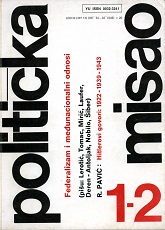Marxov pojam građanskog društva
Marx on the Bourgeois Society
Author(s): Davor RodinSubject(s): Politics, Political Sciences, Political economy, Politics and society
Published by: Fakultet političkih znanosti u Zagrebu
Keywords: Marx; Bourgeois Society;
Summary/Abstract: In his early writings Marx identified the bourgeois society with the productive sphere, irrespective of the epoch and forms within which production occurred. This historic approach to the concept of the bourgeois society is the result of Marx's early, nominalistic criticism of Hegel’s conceptual realism and is not essential to Marx’s doctrine. It was only when Marx began to search for material relations in political economy and to investigate their anatomy, as basis of the state and law, that he severed all ties with traditional philosophy of politics; he also broke with Hegel because he had discovered that dimension of the bourgeois mode of the production of life which was obscured by Hegel’s dialectic. On this basis Marx concluded that the economic production of material values is not reflexively constitutive for political activity, but that the time-specific character of the production of life determines the particular historic forms of economic production or, in a narrower sense, the production of material values. In his scrutiny of the substance of the capitalist mode of the production of life Marx analyzes the distinction between bourgeois society and state. In his anatomy of the bourgeois society he is actually striving to elucidate the origin of inequality among people in a setting of complete political equality, reaching beyond the political phenomenon.
Journal: Politička Misao
- Issue Year: XXII/1985
- Issue No: 01+02
- Page Range: 118-129
- Page Count: 12
- Language: Croatian

